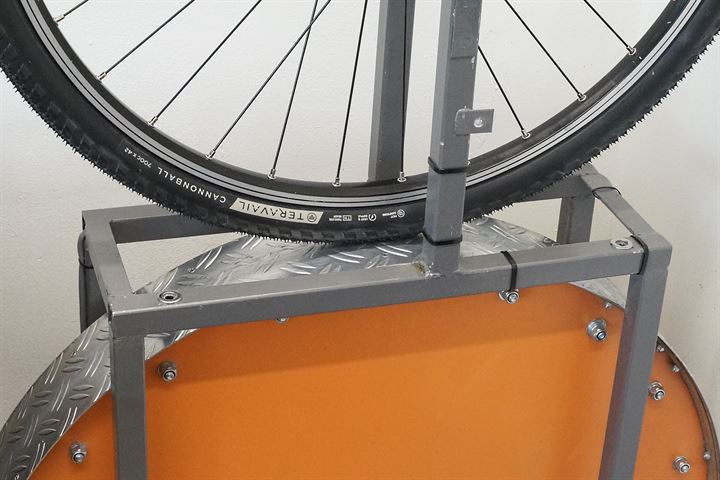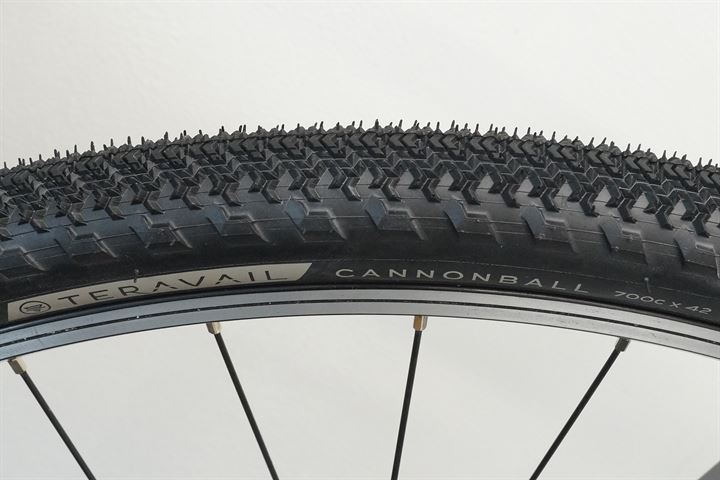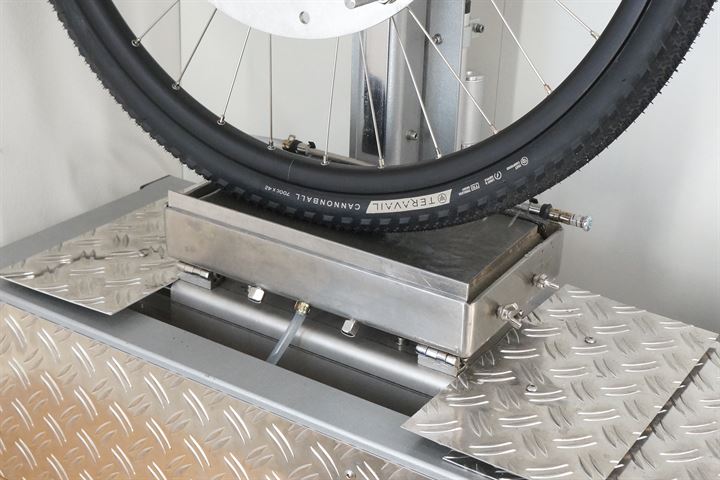CX/Gravel Tire Test: Teravail Cannonball Light & Supple 42
Contents and Test Summary
- Introduction
- Manufacturer Specifications
- Size, Weight, Thickness
- Rolling Resistance: 23.9 Watts
- Puncture Resistance: 33 Points
- Static Wet Grip: 62 Points
- Conclusion: 3.0 / 5 Recommended
- Comments
- Teravail Cannonball Light & Supple 42
(100% is best)

Teravail is a relatively new brand that offers a wide range of off-road tires that ranges from gravel bike tires all the way up to fat bike tires. The Cannonball is their most all-round gravel bike tire, and it's a good place to start testing Teravail tires and see how they perform in our tests.
Ad Buy Teravail Cannonball Light & Supple at Amazon.com
With Teravail being a relatively new tire brand, it's always exciting to see if we've found a "special" tire brand that can outperform the competition. With the Teravail brand, our hopes aren't that high as it doesn't look like they've done much research into compounds or casings. Their main effort seems to have gone into tread patterns for off-road tires. Unfortunately though, the tread pattern isn't something that makes a huge difference in our tests.
Teravail also seems to specialize in making their tires available in a huge range of different sizes. Every type and size is also available in a version with black sidewalls and a version with tan sidewalls. On top of that, you can pick any size and sidewall color in their "Endurance" casing that offers more protection or their "Light & Supple" casing that's lighter and faster.
This is a test of the 42-622 Teravail Cannonball with black sidewalls and the Light & Supple casing.
Manufacturer Specifications
| Manufacturer Specs | |
|---|---|
| Brand | Teravail |
| Model | Cannonball Light & Supple |
| Year | 2022 |
| Supplied By | Bought in store |
| New or Used | New |
| Mileage | 0 km |
| Price Range | High |
| Buy At | Ad Amazon.com |
| Manufacturer part number | TR2681 |
| TPI | 60 |
| Compound | - |
| Bead | Folding |
| ETRTO | 42-622 |
| Specified Weight | 0 grams |
| Max Air Pressure (psi) | 70 |
| Made In | Members Only |
| Available Sizes |
35-622 (700x35c) 38-622 (700x38c) 42-622 (700x42c) 47-622 (700x47c) 40-584 (650x40b) 47-584 (650x47b) |
Teravail Cannonball Light & Supple 42 Test Results

Size, Weight, and Thickness Measurements
| Size, Weight, and Thickness Measurements | |
|---|---|
| Specified Weight | 0 grams |
| Measured Weight | 530 grams |
| Measured Width Casing | 38 mm (un-round) |
| Measured Width Tread | 40 mm |
| Measured Height | 37 mm (un-round) |
| Measured Knob Height Center | 1.8 mm |
| Measured Knob Height Edge | 2.0 mm |
| Measured Total Thickness Center (excluding knobs) | 2.50 mm |
| Measured Total Thickness Sidewall | Members Only |
| All size measurements are taken at low air pressure on a 17.8 mm inner width rim. | |
Rolling Resistance Test Results
| Rolling Resistance Test Results | ||
|---|---|---|
| Inner Tube |
None (30 ml sealant) (current protocol) | Conti Cross28 (160 gr) (test protocol) |
| Measured Width | 38 mm | 38 mm |
| Rolling Resistance Real tire width in mm: 30-32 = 66 psi/4.6 bar 33-35 = 60 psi/4.1 bar 36-38 = 54 psi/3.7 bar 39-42 = 50 psi/3.4 bar 43-46 = 46 psi/3.2 bar 47-50 = 42 psi/2.9 barHigh Air Pressure (54 psi / 3.7 bar) |
Members Only | Members Only |
| Rolling Resistance Real tire width in mm: 30-32 = 55 psi/3.8 bar 33-35 = 50 psi/3.4 bar 36-38 = 45 psi/3.1 bar 39-42 = 42 psi/2.9 bar 43-46 = 38 psi/2.6 bar 47-50 = 35 psi/2.4 barMedium Air Pressure (45 psi / 3.1 bar) |
Members Only | Members Only |
| Rolling Resistance Real tire width in mm: 30-32 = 44 psi/3.0 bar 33-35 = 40 psi/2.8 bar 36-38 = 36 psi/2.6 bar 39-42 = 33 psi/2.3 bar 43-46 = 31 psi/2.1 bar 47-50 = 28 psi/1.9 barLow Air Pressure (36 psi / 2.6 bar) |
23.9 Watts CRR: 0.00716 | 27.7 Watts CRR: 0.00830 |
| Rolling Resistance Real tire width in mm: 30-32 = 33 psi/2.3 bar 33-35 = 30 psi/2.1 bar 36-38 = 27 psi/1.9 bar 39-42 = 25 psi/1.7 bar 43-46 = 23 psi/1.6 bar 47-50 = 21 psi/1.4 barExtra Low Air Pressure (27 psi / 1.9 bar) |
27.2 Watts CRR: 0.00815 | 32.2 Watts CRR: 0.00965 |
| The CX/Gravel section is a multi tire size section, air pressures have been adjusted to the measured casing width. All numbers are for a single tire at a speed of 29 km/h / 18 mph and a load of 42.5 kg / 94 lbs. Use the formula: RR (Watts) = CRR * speed (m/s) * load (N) to calculate rolling resistance at a given speed and load. |
||
Puncture Resistance Test Results

| Puncture Resistance Test Results (higher is better) | |
|---|---|
| Total Puncture Score Tread | 33 Points |
| Total Puncture Score Sidewall | Members Only |
| Tread Puncture Force Sharp Needle | Members Only |
| Tread Puncture Force Blunt Needle | Members Only |
| Tread Total Tire Thickness | 2.50 mm |
| Sidewall Puncture Force Sharp Needle | Members Only |
| Sidewall Puncture Force Blunt Needle | Members Only |
| Sidewall Total Tire Thickness | Members Only |
Hard Surface Static Grip Test Results

| Static Grip Test Results | |
|---|---|
| Wet Grip Average | 62 Points |
| Wet Grip Center | Members Only |
| Wet Grip Edge | Members Only |
| Measured Knob Height Center | 1.8 mm |
| Measured Knob Height Edge | 2.0 mm |
| Grip in points = coefficient of friction * 100 CX/Gravel grip test rim width = 23.0 mm |
|
| Wet Grip Test and Off-Road Tires (info) | |
Conclusion
- Teravail Cannonball Light & Supple 42
(100% is fastest - lightest - highest - strongest)
The Teravail Cannonball is an average performer in nearly all of our tests. The main weakness and the potential deal-breaker is the puncture resistance of the sidewalls, which may be a bit too low for a tubeless-ready gravel bike tire. As the sidewalls are much thinner than the tread, the tubeless sealant will have a tough time re-sealing a somewhat bigger puncture or cut and will leave you stranded.
As most people looking for Teravail tires probably aren't going to use them for racing, it might be wise to simply go for the Endurance casing as it should up the protection level to adequate levels and also make it a more durable tire in the long run.
Ad Buy Teravail Cannonball Light & Supple at Amazon.com
RATING:
3.0
/ 5
TEST VERDICT:
Recommended
